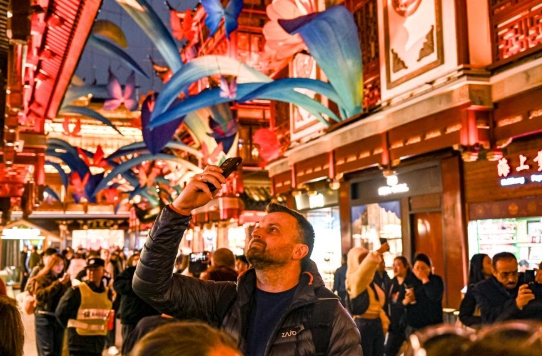China's easing of visa-free transit policy wins wide acclaim

Tourists from Spain visit Tianzifang, an art area in east China's Shanghai, Dec. 3, 2024. (Photo by Chen Haoming/Xinhua)
Upon landing at Beijing Daxing International Airport on Tuesday morning, Taylor Ethan from the United States was thrilled to find his brief stopover in China could be extended due to a fresh move by the authorities to relax the visa-free transit policy.
China announced on Tuesday a significant relaxation of its visa-free transit policy, extending the permitted stay for eligible foreign travelers from the initial 72 hours and subsequent 144 hours to 240 hours, or 10 days.
Effective immediately, 21 additional ports have been designated for visa-free entry and exit, and the areas in which transit travelers can stay have been expanded, according to a statement from the National Immigration Administration. The policy update was applauded by foreign tourists, expats in the country, and travel-industry insiders.
"It's super-cool that I can have more time traveling in China, experiencing its stunning views and culture," said Ethan who is currently enjoying a brief three-day stopover in Beijing after concluding his trip to Hong Kong, before heading to the Republic of Korea. With a longer stay made possible, he plans to visit Jingdezhen, known as China's porcelain capital, in the eastern province of Jiangxi.
Under the updated policy, eligible citizens from 54 countries, including Russia, Brazil, Britain, the United States and Canada, can enter China visa-free when transiting to a third country or region.
These travelers may now enter through any of the 60 ports across 24 provinces, autonomous regions and municipalities, and stay within the designated areas for up to 240 hours.

A tourist from Poland visits the Yuyuan Garden Mall in east China's Shanghai, Dec. 4, 2024. (Photo by Chen Haoming/Xinhua)
Data from Tongcheng Travel Holdings Limited shows that during the first hour after the policy was announced, the search volume for China's hotels and inbound flights by prospective overseas tourists increased by 87 percent compared to the same period the previous day.
FACILITATING VISITS TO CHINA
Some foreign expats in Beijing interviewed by Xinhua said the procedures for obtaining a visa to China used to be complicated, and their friends and family could only stay for several days. With the extended period and the new policy that allows intercity traveling, they can now accompany their friends or family to visit more cities.
After learning about the new policy, Max Carrera from Mexico, a travel vlogger and YouTuber based in China, told Xinhua, "I think the 240-hour policy change is awesome. Through our recent travels, we have found many travelers who really wanted to extend their time in China, and now it will be easier for them to do so without leaving the country."
"I am looking forward to inviting my followers to come and get to know this beautiful country," he said.
Wang Lei, a professor at Beijing Normal University, applauded the policy as a clear demonstration of China's further opening up -- to a deeper and broader extent.
"Through one-way and proactive opening-up measures, we are presenting to the international community a confident, open and inclusive image of our country," said Wang.
BOOSTING INBOUND TOURISM
The policy upgrade was welcomed by the travel industry and businesses in the related supply chains.
Since the beginning of this year, with the launch of the visa-free transit policy, the inbound-tourism market in Beijing has recovered faster. So far this year, the number of foreign guests received at Beijing's landmark Silk Street Market has seen substantial growth compared to last year, said Dong Qing, president of Beijing Silk Street Business Management Co., Ltd., recognizing the policy as a boon for their businesses.

Tourists from Hungary show souvenirs bought at Tiantan (Temple of Heaven) Park in Beijing, capital of China, Dec. 5, 2024. (Xinhua/Ju Huanzong)
Guangxi Sunrise International Travel Service Co., Ltd., a travel agency based in the southern Guangxi Zhuang Autonomous Region, has seen a significant increase in the number of foreign tourists in 2024, according to company chairman Charlie Chen.
"The extension of the visa-free stay will allow us to offer tourist routes outside the staple itineraries, such as Beijing, Shanghai and Xi'an. Rather, we may extend their visits to, for example, other places in Guangxi to enable foreign tourists to learn more about the country," Chen said.
Furthermore, as the policy reduces the amount that overseas tourists pay to obtain visas, it will assist the travel agents in their marketing campaigns, said Chen.
Jacques Duquenne, a Belgian who lives in Guangxi and works for a European travel agency, said, "The new policy will not change a lot for me, as my clients are mainly Belgians and French who enjoy already 30-day visa-free trips to China. But it shows China's commitment to open up to the world, and this builds trust for the travelers."
Zhang Mingyang, a senior researcher at the Tongcheng research institute, said the extension of the transit visa-free policy and the expansion of eligible destinations will attract more foreigners to visit China, thereby further promoting the growth of China's inbound-tourism market.
China recorded nearly 29.22 million inbound foreign visits between January and November 2024, up 86.2 percent year on year. Of these, 17.45 million entered the country visa-free, marking a significant 123.3 percent year-on-year growth.
Editor:伏娅敏
